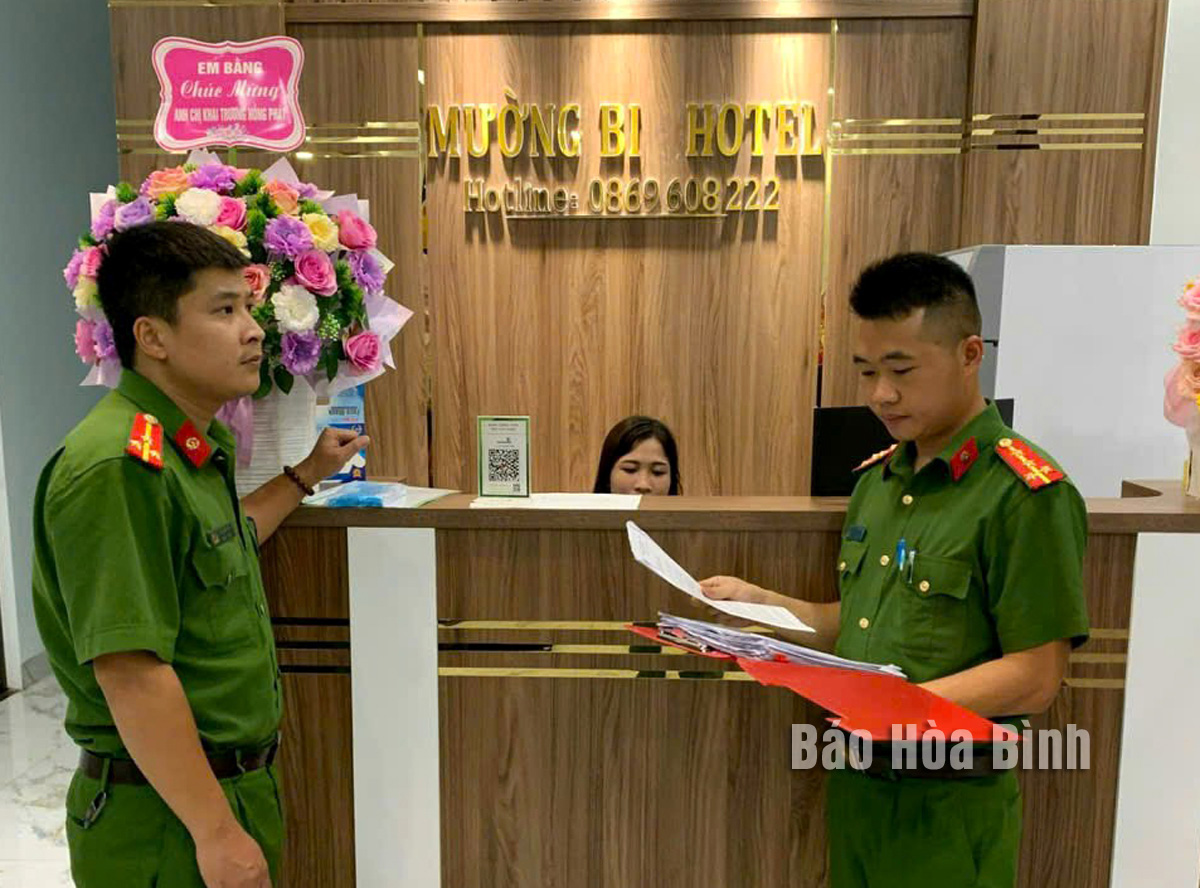
Being considered as the core and central tourism area of Mai Chau district, Chieng Chau commune currently hosts 103 accommodation facilities. Each year, the commune welcomes hundreds of thousand tuns of domestic and international visitors. According to The captain Nguyen Tuan Anh, the Deputy Chief of Chieng Chau commune’s Public Security, thanks to the effective state management in public security and order, particularly through promoting the community involvement in the "All People Protect the National Security” movement, Chieng Chau has, been a shining example in ensuring public order in general and tourism security in particular for many years.
Phong Phu commune’s Public Security (Tan Lac District) are inspecting the lodging and tourism service establishments in the area to ensure the safety and security of visitors.
Similar to Chieng Chau, two Mong ethnic communes of Hang Kia and Pa Co (Mai Chau) were previously hotspots for complex issues related to crime and social evils, especially drug-related problems. Since the police force has actively addressed crime and drug-related issues while ensuring the safety of tourists, these areas have gradually transformed into the notable destinations on Mai Chau’s and the province’s tourism map.
According to the assessments, since the implementation of Directive No. 49-CT/TU dated December 27, 2023 by the Provincial Party Committee on enhancing the Party’s leadership in managing and promoting tourism development in the province, the provincial Public Security have strictly followed the directive, organizing and deploying measures to ensure tourism security.
The police force has effectively advised Party committees and the authorities at all levels, especially in areas with frequent international tourists, to enhance the "All People Protect National Security” movement. At the same time, they have promoted local tourism while raising public awareness against criminal activities that exploit tourism to spread propaganda, illegal religious teachings, or incite social unrest, ensuring stability and safety for visitors. The authorities have closely monitored tourism activities, accommodation providers, and service operations in key tourism zones with high visitor numbers.
Thanks to their proactive efforts, the provincial police identified and addressed a case involving a foreign national suspected of using tourism as a cover to gather state secrets. They also caught 20 individuals in the act of organizing and participating in illegal gambling on Hoa Binh Lake in Thung Nai Commune (Cao Phong), and promptly investigated a theft targeting the foreign tourists at Hill Top Valley Golf Course (Hoa Binh City).
The statistics have shown that the province currently has 9 recognized tourism sites and 1 official tourism area. Around 500 accommodation facilities are certified and classified, including 1 four-star hotel, 10 three-star hotels, 23 resorts and two-star hotels, 8 one-star hotels, and various guesthouses and community-based homestays. The province is also the home to 4 international travel companies, 18 domestic travel companies with branch offices, 2 golf courses, and 1 paragliding site authorized by the province.
According to Lieutenant Colonel Bui Viet Hung, the Deputy Director of the provincial Public Security, with the rapid growth of tourism in the province, the Police Directorate of the province has instructed the functional units and the local police forces in tourism areas to strengthen oversight and inspections of tourism-related businesses and accommodations. The goal is to prevent incidents such as overcharging, harassment, or scams targeting tourists, especially foreign visitors. Additionally, the provincial Public Security has proactively coordinated with the local authorities to conduct regular and surprise inspections to promptly identify and correct violations. Additionally, provincial police units have worked closely with local authorities to conduct regular and surprise inspections to promptly identify and correct violations.
As a result of the effective advisory work and state management of public order relating to tourism security, the police agencies have recently inspected over 100 tourism-related businesses, conducted regular checks on more than 650 accommodation and tourism establishments regarding fire safety, issued 732 recommendations and noted 25 shortcomings regarding fire safety. They also documented 115 violations related to passenger transport operations, such as the failure to wear life jackets or the lack of life-saving equipment on boats carrying tourists within the area of Hoa Binh lake.
These achievements have significantly contributed to creating a safe and welcoming environment that attracts tourists and promotes the province as a desirable destination to both domestic and international tourists.
With its pristine landscapes, unique cultural heritage of Muong ethnic minority, and an expanding range of visitor experiences, Tan Lac district of Hoa Binh has fast become a captivating destination for both domestic and international tourists.
Until now, Sung village in Cao Son commune, Da Bac district remains the only Dao ethnic community in Hoa Binh province to develop a community-based tourism model. Beyond its untouched natural landscapes, cultural identity serves as the cornerstone attraction for visitors.
Alongside the diverse cultural identities of the Kinh, Muong, Tay, Thai, Dao, and Mong ethnic people, Hoa Binh province is also renowned as the "capital" of the northwestern Vietnamese cuisine, offering unique and distinctive dishes. At festivals, during Lunar New Year (Tet), or on significant family or community occasions, special dishes are prepared, leaving a lasting impression on visitors.
A Phong Linh (Yellow Tabebuia) flower garden in Thang village, Thach Yen commune, Cao Phong district is currently in full bloom, drawing a large number of visitors.
Community-based tourism has been thriving in Pa Co commune, Mai Chau district thanks to advantages in natural landscape and cultural identity.
Doan Ket commune of Yen Thuy district has recently held a ceremony to receive a certificate recognising Ta communal house as a provincial-level historical and cultural relic site.



